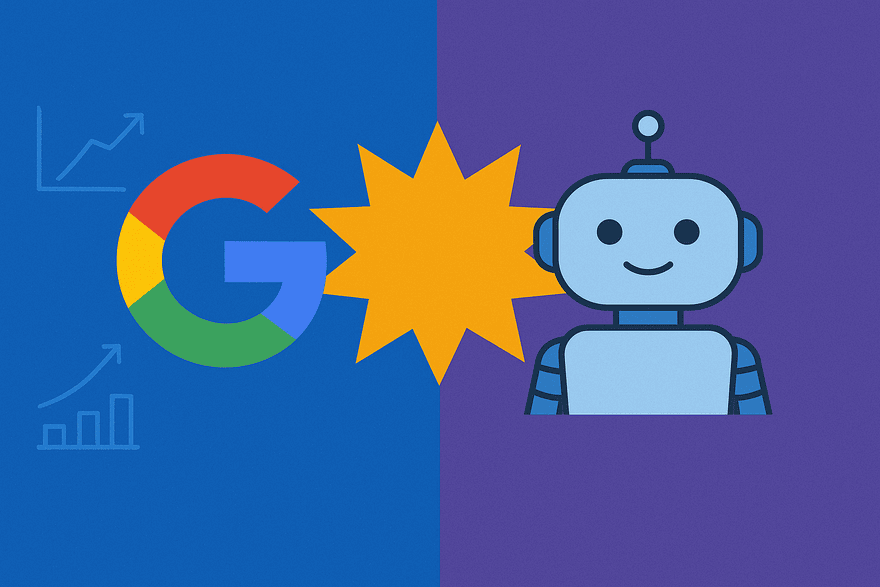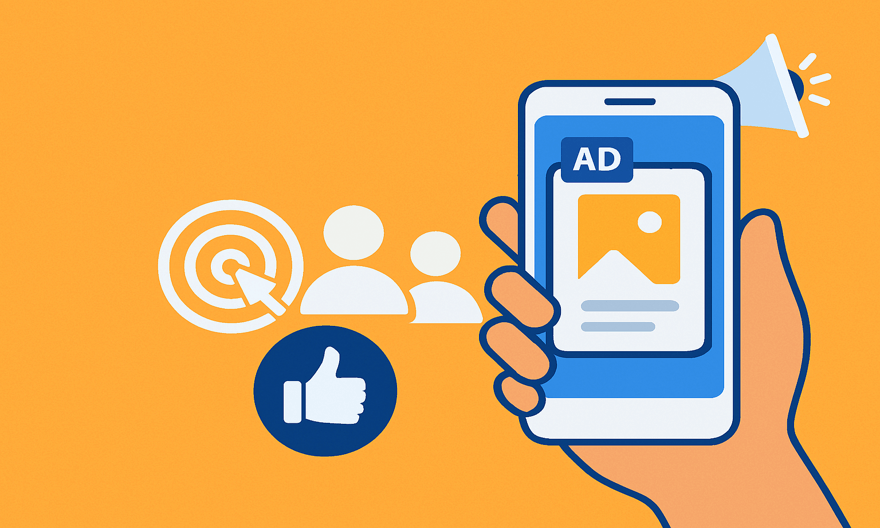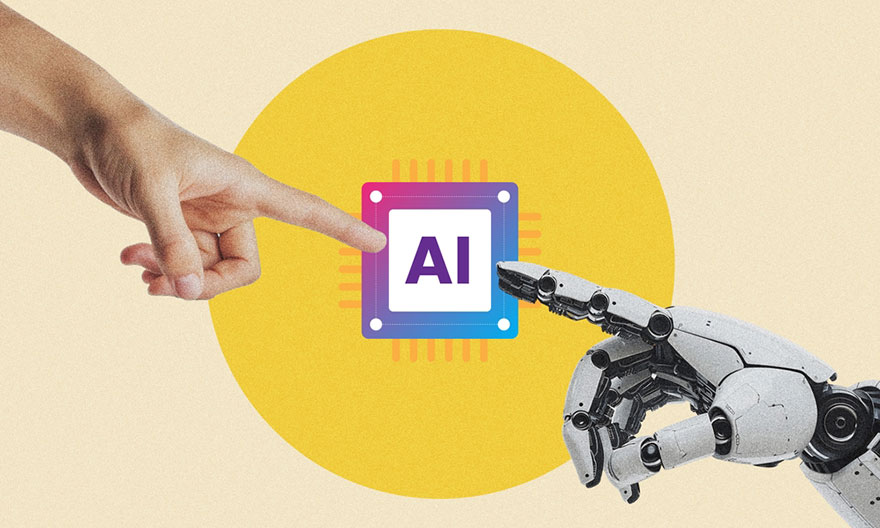
Google vs AI Chatbots: Who’s Winning the Traffic War?
As AI chatbots like ChatGPT, Claude, and Grok explode in popularity, many are wondering if Google’s days at the top are numbered. We unpick the key findings from a major new 24-month traffic study that addresses this very question…
TL;DR
AI chatbots like ChatGPT are growing super-fast, with traffic up over 80% year-over-year. But traditional search engines like Google still dominate, according to in-depth research, driving 34x more visits.
Instead of taking over from search engines, the research found, chatbots are carving out their own space for quick, conversational queries. Meanwhile, search engines remain the go-to for deeper research and shopping decisions.
So smart brands are starting to optimise for both because the future of online search is all about hybrid habits, not a winner-takes-all battle.
Remember when Google was the default starting point for everything online, from finding a new dinner recipe to diagnosing that weird noise your car makes? But as we all know by now, there’s a rival in town – the AI chatbot.
Tools like ChatGPT, Gemini and Claude are steadily reconfiguring the way we interact with the web. Instead of wading through pages of blue links, we’re now often having full-on conversations with AI, getting instant, tailored answers. Often it feels faster and more frictionless, even a tad addictive.
Which leads us to the question that more and more marketers are wondering: Are AI chatbots about to knock Google off its throne? To answer this question, a white paper from OneLittleWeb dived into two years of global web traffic to see how AI chatbots stack up against the old-school search engine giants.
AI chatbots v Google: Key findings at a glance
The result isn’t as simple as ‘AI wins, Google loses’. There’s some complexity and nuance here. Here’s the breakdown:
AI Chatbots are surging
AI chatbots have exploded with 80.92% year-over-year (YoY) growth, racking up 55.2billion visits between April 2024 and March 2025.
Search engines have dipped – but volume gap remains
Traditional search engines like Google and Bing have seen a tiny 0.51% YoY drop, totaling 1.86trillion visits over the same period. But even with that huge-sounding growth, chatbot traffic is still 34x smaller than search engines.
ChatGPT leads the way but challengers emerge
ChatGPT dominates the chatbot world with an 86.32% market share, while Google continues to dominate search with 87.57%.
Meanwhile, platforms like DeepSeek (up 113,007% in traffic) and Grok are gaining traction fast, signalling that the chatbot market is about to get a lot more competitive.
AI Chatbots: Huge growth but it’s all relative
There’s no question: AI chatbots are having their moment. ChatGPT alone saw 47.7billion visits in just one year – a 67.09% YoY jump. OpenAI’s biggest competitor, Claude (by Anthropic), is also showing steady gains, along with new entrants like Grok by xAI (Elon Musk’s AI startup) and DeepSeek.
Take a look at these growth stats:
- Claude grew 1,217% YoY.
- Grok, although smaller in user base, has recorded an impressive 1,029% growth since launch.
- DeepSeek burst onto the scene with unprecedented momentum, up 113,007% YoY.
Clearly, users are curious and willing to explore beyond ChatGPT, and there’s the strong suggestion that the AI chatbot landscape won’t remain a one-horse race for long.
And yet, even with all that momentum, chatbots collectively still only attract 3% of the traffic that search engines achieve. At this point chatbot performance is still like a shiny new speedboat bouncing along next to an oil tanker. It’s impressive, but dwarfed still by several magnitudes of scales down. For now, at least.
Search Engines integrate to stay competitive
Search engines, especially Google, aren’t sitting ducks. While total search traffic dipped slightly, they still drive vast pull eye-watering numbers.
Google, for example, drove 1.63trillion visits in the period April 2024-March 2025. Bing is still holding steady, despite the new competition. DuckDuckGo, meanwhile, and a niche player, continues to cater to privacy-conscious users.
Google’s secret weapon is integration. It’s been steadily weaving AI into search experience through AI Overviews and SGE (Search Generative Experience), offering snippets and quick answers straight on the search page. This keeps users within Google’s ecosystem – no chatbot download required.
How do people choose between AI and search engines?
Digging into user behaviour reveals some interesting insights. In a nutshell, people trust AI chatbots for quick advice and instant creativity. But when they want options, products or deep research, they still turn to search engines.
- Chatbots are often used for quick, complex queries like ‘Explain quantum physics in simple terms’ (!) or ‘draft a thank-you email’.
- Search engines still dominate for broader searches like ‘best hiking shoes 2025’ or ‘Italian restaurants near me’.
Coexistence, not a knockout fight
OneLittleWeb’s data paints a pretty clear picture of a key principle: AI chatbots aren’t replacing search engines, they’re augmenting them.
This dynamic is reshaping the customer journey. For example:
- You brainstorm your holiday ideas with ChatGPT.
- You then Google hotels and flights.
- Finally, you cross-check reviews and book online.
It’s clear that AI chatbots are moving into the awareness and consideration stages of the buyer journey, areas previously dominated by search alone.
What does this all mean for SEO and digital strategy?
If you’re in marketing, SEO, or content creation, this report confirms the digital landscape is getting a new layer. Here’s what savvy brands should start doing:
- Double down on quality content: Like Google, chatbots prioritise well-written, authoritative content. That means avoiding content that looks like fluff or clickbait.
- Think ‘AI-first’ content: Optimise not just for Google, but also for AI chatbots. Clear answers, featured snippets, FAQ-style formats and structured content make it easier for AI to pull your info.
- Reputation management: AI tools are starting to summarise brand reputations automatically (see next section). Having strong reviews and public sentiment online matters even more now.
- Think E-E-A-T (Experience, Expertise, Authority, Trustworthiness): This Google standard is critical across the board, as it’s also influencing how AI chooses what content to serve.
How does a chatbot ‘summarise’ a brand?
You no longer control your brand narrative solely through your own site. AI is now a digital gatekeeper, and it’s ready to package its own first impressions of your business based on what it finds out there online.
So when someone asks an AI something like ‘Is [Brand X] worth it?’ or ‘What do people think of [Brand Y]?’ or ‘Best alternatives to [Brand Z]?’, the AI doesn’t just give search results. It often writes a short summary, pulling together the prevailing opinion from its sources. That could look like:
‘Brand X is known for fast customer support and user-friendly tools, but some users say the pricing is a bit steep.’
The AI comes up with this text by a number of routes:
- Scraping and ingesting public data
- Detecting sentiment and patterns
- Pulling in cases from real-time APIs
Scraping and ingesting public data
AI tools like ChatGPT, Claude, Gemini, and Perplexity have been trained on vast datasets that include:
- Public websites
- News articles
- Product reviews (from sites like Trustpilot, G2, Amazon)
- Forums like Reddit and Quora
- Social media (sometimes via plugins/APIs)
- Company blogs and press releases.
Detecting sentiment and patterns
AI models use Natural Language Processing (NLP) to:
- Gauge sentiment (positive, neutral, negative) in reviews and social chatter
- Identify common themes eg ‘fast customer support’, ‘expensive but high quality’, ‘app keeps glitching’ etc
- Spot influencer and media mentions, and assess their tone and sentiment.
Pulling in cases from real-time APIs
Tools like Perplexity or plugins for ChatGPT can also use live sources (like Google Reviews or Glassdoor) to serve up real-time info. This means your latest reviews could influence the AI’s answer today.
All this means is that having strong reviews and public sentiment online matters even more now, so it’s vital to adapt your strategy accordingly.
The future is hybrid
So the next phase of the internet isn’t a battle between AI chatbots and search engines – it’s a tag-team effort. Users will toggle between the two depending on their needs.
For now, search engines continue to reign supreme, not just by force of volume and historic habit but by integrating new AI-driven features to keep up on site. At the same time, AI chatbots are rapidly evolving, becoming more sophisticated and more woven into everyday workflows.
The brands that win out will be those that stay agile, produce genuinely useful content, and think multi-channel from day one.
- Here’s the link to the OneLittleWeb white paper again: AI Chatbots vs Search Engines: 24-Month Study on Traffic Trends.
Contact us
At Chillibyte, we specialise in future-proofing brands for both search engines and AI-driven platforms. Keen to know more? Get in touch with us today to find out how we can help.




